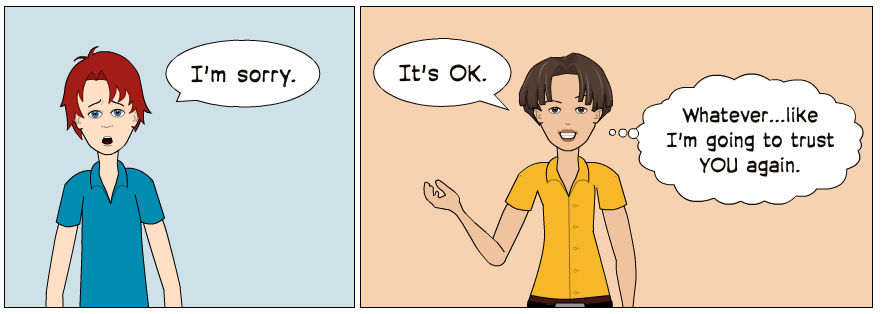The Incomplete Apology
In NVC we talk about “Giraffe Apologies” – using NVC to express regret, name the needs not met, and re-connect. This post is the second of two (here’s the first) that explores how our usual way of apologizing can fail to meet needs, and then how we might do it differently.
This has happened to myself on many occasions, in both directions:

Person B remains guarded and Person A remains guilty.
There is no repair–the trust does not get re-established. The social duty has been performed, but its function has not been fulfilled.
What happened?
- Person A did not express a full apology: acknowledgement, regret, naming of needs unmet, and invitation to hear the other’s experience.
- Person B is not being honest: they are minimizing the impact or damage. They haven’t shown up fully in the apology as receivers, and thus their needs don’t get fully heard and met. This is a tragic strategy to create harmony that short-circuits the repair attempt.
The social ritual of apology eases some needs for safety because there is a shared reality and some acknowledgement of what happened. But it stops short of truly repairing the connection.
Why do we do this?
Minimizing our hurt, rushing through an apology, or dismissing the need for one are all ways to push away our discomfort with pain, and stay guarded against vulnerability.
If you look at how we handle disconnect in general, it is not surprising that we end up with incomplete apologies. It starts with how we handle disconnect in the first place.
When disconnect happens, it hurts. It’s a shock to our system.
However, we have an instinctual impulse and cultural conditioning that tells us not to feel this effect–to gloss it over or deny it.
Here are some things you might have said to yourself, or to other people, during disconnect:
- Whatever. If she wants to be that way, then fine.
- I guess this is just how it is.
- I guess it’s good because now I know what kind of friend I have.
- He started it, and he should be the one to call.
- It’s not that big of a deal. I should just get over it.
- Why did she do that? Maybe it’s because I said this. Maybe if I had done that instead… (endless stream of analysis).
Analysis, denial, rationalization, resignation–these are all ways to push the pain of disconnect away from us when we feel helpless about repairing it.
Cutting an apology short or brushing it off is just another way to stay guarded from these painful feelings. Unfortunately, doing that leaves us in our disconnected state.
To re-establish connection, both people need to be vulnerable again. The foundation of repairing disconnect is to create enough safety in ourselves and trust in the connection for vulnerability to be possible. And that is the heart of NVC–speaking and hearing in a way that lets you stay open-hearted and vulnerable.

If my writing has helped you, you can leave a tip at buymeacoffee.com, leave a comment below, learn more about me, or follow me on Instagram.
Also! I’m also looking to start a community of people looking to build authentic connnections & grow together.
Thanks so much for reading! ~Emma

